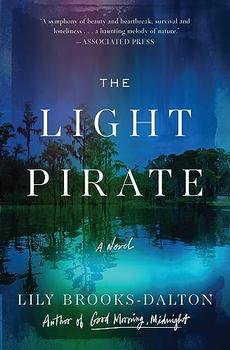Summary | Excerpt | Reading Guide | Reviews | Beyond the Book | Readalikes | Genres & Themes | Author Bio

Kirby lifts a conciliatory hand when he sees her there in the window, and Frida, still holding her belly, trying to shrug away this sense of dread, turns away without acknowledging him—not because she is angry but because she is frightened. When they fought earlier, he took her frantic appeals to evacuate as an insult. "Why can't you just trust me?" he asked, bewildered. She didn't know how to tell him that this was the wrong question without knowing what the right one was. They still haven't made up.
Kirby's boys come tearing into the kitchen just then, all arms and legs and sounds too big for those little bodies. They are immune to the fear that curls up on Frida's shoulders, nestling softly against her neck, pressing up against her windpipe—a gentle, invisible stranglehold. They feel only excitement in the simmering electricity of the atmosphere, the barometric pressure plummeting as each hour passes. She can almost see the current running through them: Lucas skidding across the tile floor in his dirty white socks, Flip leaping after him, midair, falling, fallen, and upright again, all in the space of a breath.
"Boys," she chides, doing her best impression of a mother. She has so little to guide her in these matters—when she was growing up, her own mother's defining characteristic was her lack of mother-ness. Everyone said so. It isn't that Frida regrets the way Joy raised her. How could she? Her childhood was singular, spent sailing between islands, with salt in every crevice and a vision of the sun permanently etched into the backs of her eyelids. She grew up everywhere and nowhere. The Keys, Puerto Rico, the Bahamas, Haiti, Panama, Venezuela. The only constants during Frida's formative years were her mother and their decrepit sailboat and the ocean itself. There was no school outside of Joy's instruction, and the friends she did manage to make could last only until Joy announced a departure date. When they pulled anchor, Joy always said it was time to find a new pair of sea legs. What's wrong with the old ones? Frida would think. But she never complained. Of course she used to be brave. She had to be.
"Boys!" Frida says again, louder this time, but it still feels like a performance, something she's only seen on television. They can tell, and so can she. If Joy were here, she would do all of this differently. She would be running through the house alongside them, playing their games, learning their secrets. She would be so unrelenting in her mission to win them over that finally these boys would have no choice but to love her. Except Joy isn't here. This is the ache Frida is learning to live with.
She hears Flip and Lucas hurtling through the living room, the brisk creak of the screen door opening, and then a slap as it swings back against its frame. Out of sight, Kirby roars and the boys shriek, even Lucas, who recently decided that twelve was too old for games like this. All three of them round the edge of the house, back into view—the boys darting past the window, Kirby lumbering behind them with arms overhead, fingers wiggling. Frida instructs her nerves to settle and shoos away this circling, spinning unease. See, she tells herself, it isn't real. No one else feels it. Everything is fine. She holds this assurance. Examines it. Does she feel better? Maybe. But then the baby, turning again and again, thrusting its limbs up against the constraints of her womb, up into her intestines, dislodges the seed of calm. Everything is not fine.
Excerpted from The Light Pirate by Lily Brooks-Dalton. Copyright © 2022 by Lily Brooks-Dalton. Excerpted by permission of Grand Central Publishing. All rights reserved. No part of this excerpt may be reproduced or reprinted without permission in writing from the publisher.
Chance favors only the prepared mind
Click Here to find out who said this, as well as discovering other famous literary quotes!
Your guide toexceptional books
BookBrowse seeks out and recommends the best in contemporary fiction and nonfiction—books that not only engage and entertain but also deepen our understanding of ourselves and the world around us.